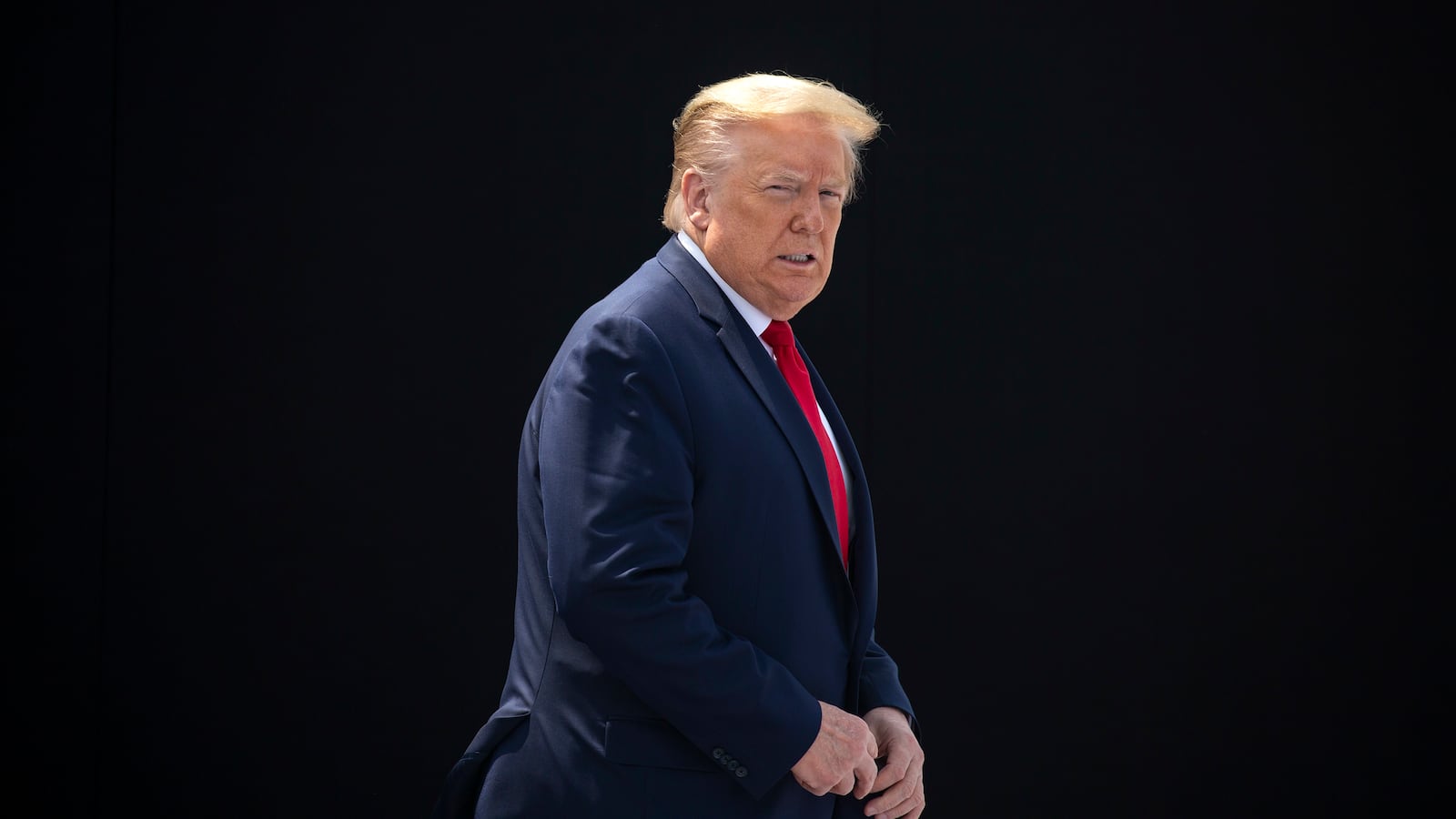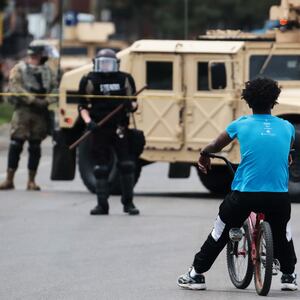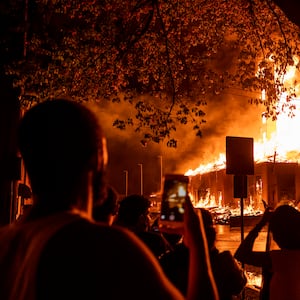The coronavirus pandemic stole from President Donald Trump his most prized political possession: a booming U.S. economy. Now racial unrest in Minnesota threatens to steal his second-most-prized one: an image of power and stability that he can project to supporters and adversaries alike.
Hours into a spate of destruction and arrests in Minneapolis after the police killing of an unarmed black man, Trump was already threatening to send in the National Guard and warning that “looters” in the city would be shot—employing a phrase popularized by a former Miami police chief famous for “tough-on-crime” policies that targeted citizens of color.
Trump walked back the latter statement a few hours later, saying he only meant that looters could end up shooting people, not that they should be shot. “I’ve heard that phrase for a long time. I don’t know where it came from or where it originated,” he declared later. “I wouldn't know a thing like that.”
But his immediate jump to a forceful and potentially deadly resolution to the unrest underscored what knowledgeable sources said is deep distress at events that, in Trump’s view, make him appear weak. He told reporters at the White House on Friday that he didn’t want Minneapolis to "descend further into lawless anarchy and chaos."
There’s a personal branding aspect to that desire, one former senior administration official told The Daily Beast. “He sees civil disturbance as a referendum on his leadership,” the source said. "A show of force like sending in the National Guard is a way to reassert that authority and show he's in control.”
And on Friday, protests continued to spread across several U.S. cities, hours after the former Minneapolis cop was charged. The chants reached Trump’s doorstep when a crowd of marchers and activists gathered near 1600 Pennsylvania Ave., leading to the Secret Service briefly locking down the White House. The president reacted on Saturday morning by tweeting through his anger at the people protesting police violence.
“I was inside [the White House], watched every move, and couldn’t have felt more safe,” Trump posted to Twitter, adding that the Secret Service “let the ‘protesters’ scream & rant as much as they wanted, but whenever someone got too frisky or out of line, they would quickly come down on them, hard - didn’t know what hit them.”
The president went on to warn that, had protesters started breaching “the fence” protecting White House grounds, they would “have been greeted with the most vicious dogs, and most ominous weapons, I have ever seen. That’s when people would have been really badly hurt, at least. Many Secret Service agents just waiting for action.”
A key component of Trump’s political appeal amid his meteoric rise during in 2015 and 2016 was his reliance on old-school law-and-order rhetoric that tacitly—and sometimes explicitly—laid the blame for civil unrest at the feet of his opponents and Washington’s political class. In many cases, that manifested in his reactions to previous riots and demonstrations in response to high-profile police killings.
“Our country is totally fractured and, with our weak leadership in Washington, you can expect Ferguson type riots and looting in other places,” Trump tweeted in the wake of unrest in Ferguson, Missouri, following the police shooting of Michael Brown. That unrest, in Trump’s view, made the country and its leaders look weak and ineffectual.
“As China and the rest of the World continue to rip off the U.S. economically, they laugh at us and our president over the riots in Ferguson!” he declared in one tweet. “Can you imagine what Putin and all of our friends and enemies throughout the world are saying about the U.S. as they watch the Ferguson riot,” he said in another.
In Trump’s mind, he was the antidote, and his supporters latched onto that image of a strong leader in firm control. The prospect of losing that image—and winding up on the receiving end of the same sorts of barbs he threw President Barack Obama’s way in 2014—makes him prone to visceral reactions when cable news networks broadcast images such as a burning American city onto his television, the former administration official said.
It was the same impulse that led Trump to suggest in 2017 that he might employ the National Guard in an attempt to quell high rates of violent crime in Chicago. Just a year earlier, he’d booked a rally in the city that devolved into chaos when protesters succeeded in shutting down the event.
Trump tried to turn it into a political asset. The protesters, he said at the time, “have totally energized America!”
The unrest that Trump makes political hay of, in the end, is almost always the episodes that involve minority communities. As president, he notably tried to play the role of reconciliator for the white nationalist riots that upended Charlottesville and resulted in the death of a young woman. In the days prior to Minneapolis’ burning, Trump urged the Democratic governor of Michigan to have empathy and even meet with the armed white protestors who were demanding that she reopen the state more quickly in the wake of the COVID-related shutdown.
That dichotomous approach is part of his political appeal. And as he was walking back the harsh tones of his looter tweets, some in the conservative media were encouraging him to act on it, fearful that something perceived as less forceful would be a potential body blow to his political brand.
“Where is the law and order President?” asked Spectator columnist Amber Athey on Friday. “President Trump ought to be the tough but moral leader the city needs right now,” Athey wrote, “but his initial response was just as spineless as the rest.”
As he continues to address the matter in the coming days and weeks, it’s highly unlikely that Trump will drift away from his typical “tough on crime” posturing, in part because he sees it as so integral to his political identity and victory.
“The president sees attacks on the police as an attack on a key constituency,” said a current senior Trump administration official. “He sees his strong support for police officers...as a core part of who he is as a winner...I’ve heard him say several times [in recent months] things like, ‘I will never abandon our police. Joe Biden will.’”
But there are complications. Trump isn’t simply running for office anymore. He’s holding it. And a tinderbox like Minneapolis is not so easy to address when the buck now stops with you.
Just as he mused they would after Ferguson, Chinese government mouthpieces were quick to seize on the unrest there Friday to try to ding the administration.








